@Tim Mylott,
The entire issue arose from a script that was generated off my production system from Powershell's DBATools' Export-DbaLogin command.
The output script from that tool was like your first text.txt file in that it issues blind CREATE USER commands without first testing to see if the user already existed.
This was inadequate for our needs (our production DB and system have been around for years and now has old, bad 'lint' all over the place in it), so I took the script output into Notepad++ and added the IF NOT EXIST... test logic (see the script in the original question for details) as a prefix to the CREATE USER commands in the script with a global search & replace. Only, I had to put @@Placeholder@@ in for the username in the SELECT's WHERE clause for the test.
This left me with a script where I had to replace the @@Placeholder@@ text with the actual username strings in the existing CREATE USER text on the same line in the script file.
The solution, in NP++, which you led me to, was to use Regex in the NP++ Search to select the userid string in the same line. From there, it was fairly easy and straightforward to use a NP++ macro recording to automate the search & replace.
First, I found online a regex to select the text between the first matching pair of []s, which is: (?<=[).+?(?=])
The NP++ script recording was basically this (start Macro recording):
Find:@@PlaceHolder@@ (non-regex search) [NP++ finds the next line to alter]
[Home] (to find the beginning of the line)
Find: (?<=[).+?(?=]) (regex search) [NP++ selects the UserID string in the CREATE USER part of the line)
[Ctrl+C] (copy UserID string to clipboard once Find dialog is closed)
[Home] (to find the beginning of the line again)
Find:@@PlaceHolder@@ (non-regex search) [NP++ finds the @@Placeholder@@ text in the current line and selects it]
[Ctrl+V] (paste in the UserID string from the clipboard)
(this leaves the cursor on the same location where the corrected command can be visually verified as correct)
In NP++ Use the Play Macro button to manually replay this recorded macro a few times to assure the macro has it right...
Then, use the play multiple times (until the end of file is reached), and Voila!
The script file is all fixed up.
[Note: the DBATools GitHub now has 2 bug reports/requests to add this IF NOT EXISTS logic to the CREATE USER lines in the generated script, so this issue will eventually go away, but for now... there is at least one reasonable solution using NotePad++.]
So, Thank You, Tim, for leading me to a quick answer.
That said, though, your Powershell part of the answer was wrong, so no points there! (it was doing the wrong thing and putting "@@Placeholder@@" INTO the script, rather than replacing the existing "@@PlaceHolder@@" string in the script with the actual UserID strings already IN the script.
To repeat, the problem was (logically) to go:
-- FROM THIS:
IF NOT EXISTS (SELECT ... WHERE name = '@@PlaceHolder@@') CREATE USER [MyDomain\AUser2]...
IF NOT EXISTS (SELECT ... WHERE name = '@@PlaceHolder@@') CREATE USER [MyDomain\AUser3]...
IF NOT EXISTS (SELECT ... WHERE name = '@@PlaceHolder@@') CREATE USER [MyDomain\AUser5]...
IF NOT EXISTS (SELECT ... WHERE name = '@@PlaceHolder@@') CREATE USER [MyDomain\AUser1]...
IF NOT EXISTS (SELECT ... WHERE name = '@@PlaceHolder@@') CREATE USER [MyDomain\AUser7]...
IF NOT EXISTS (SELECT ... WHERE name = '@@PlaceHolder@@') CREATE USER [MyDomain\AUser8]...
IF NOT EXISTS (SELECT ... WHERE name = '@@PlaceHolder@@') CREATE USER [MyDomain\AUserA]...
IF NOT EXISTS (SELECT ... WHERE name = '@@PlaceHolder@@') CREATE USER [MyDomain\AUserB]...
IF NOT EXISTS (SELECT ... WHERE name = '@@PlaceHolder@@') CREATE USER [MyDomain\AUserC]...
-- TO THIS:
IF NOT EXISTS (SELECT ... WHERE name = 'MyDomain\AUser2') CREATE USER [MyDomain\AUser2]...
IF NOT EXISTS (SELECT ... WHERE name = 'MyDomain\AUser3') CREATE USER [MyDomain\AUser3]...
IF NOT EXISTS (SELECT ... WHERE name = 'MyDomain\AUser5') CREATE USER [MyDomain\AUser5]...
IF NOT EXISTS (SELECT ... WHERE name = 'MyDomain\AUser1') CREATE USER [MyDomain\AUser1]...
IF NOT EXISTS (SELECT ... WHERE name = 'MyDomain\AUser7') CREATE USER [MyDomain\AUser7]...
IF NOT EXISTS (SELECT ... WHERE name = 'MyDomain\AUser8') CREATE USER [MyDomain\AUser8]...
IF NOT EXISTS (SELECT ... WHERE name = 'MyDomain\AUserA') CREATE USER [MyDomain\AUserA]...
IF NOT EXISTS (SELECT ... WHERE name = 'MyDomain\AUserB') CREATE USER [MyDomain\AUserB]...
IF NOT EXISTS (SELECT ... WHERE name = 'MyDomain\AUserC') CREATE USER [MyDomain\AUserC]…
Revised Script from Tim's excellent start (version 2) :-)
#create new output file
new-item "C:\temp\test2.sql" -Force
foreach ($line in (get-content "C:\temp\test.sql"))
{
if ($line.Contains("@@Placeholder@@"))
{
#Find the the user between the brackets and remove the brackets.
$user = ([regex]"\[.+?\]").Match($line).value.replace("[","").replace("]","")
#Replace PlaceHolder with user pulled from the brackets and write to new file
$line -replace '@@Placeholder@@', $user | out-file "C:\temp\test2.sql" -Append
}
else
{
out-file "C:\temp\test2.sql" -Append -InputObject $line
}
}
...Had to tweak the Regex (to less permissive) and output all the rest of the script lines too.


